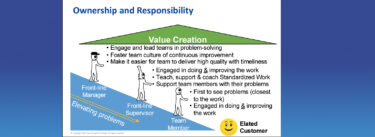What if you’re a continuous improvement professional tasked with – you guessed it – continuously improving the work and your top executives don’t see any value in the initative? Or, better yet: your executives only think C.I. is something that can be done if there is “free” time in everyone’s already busy days. All this C.I. business sounds rather fishy to them. They just aren’t sure they can trust folks who want to change their perfectly comfortable routine. Sound familiar?
People don’t like change. And executives, accomplished as they are, are people after all. Sure, they are (most likely) smart ladies and gentlemen who strived hard to be where they are in the company and yes, they may know how to play a mean game of golf. This doesn’t mean that they will immediately get what you are trying to accomplish with continuous improvement, change management, quality assurance, Lean, Six Sigma, or any other change methodology focused on improving the current state. And, as you know if you’re already a change agent, if your top leaders don’t buy into continuous improvement (in whatever form it’s presented), the likelihood of your company undergoing a successful transformation is low.
When discussing C.I. to executives, as another lean practitioner Janice Braithwaite wrote in November, 2013, focus your conversation around cost and growing the bottom line. Lean, for example, will increase profitability just through waste reduction and ensuring consistency or repeatability. Practice lean thinking consistently and you’ll use fewer resources to process more information, widgets, etc. However, in order to speak the same language as the executive team, you probably need to focus on ROI.
Make sure that any executive reporting is done from a cost or profit impact perspective, i.e. “We saved 20 man hours per week by improving X Process, which equates to $/week.” If you aren’t reporting to your top executives or supporting managers, add it to your schedule and make your lean experiments and improvements a part of the discussion. When executives truly understand what you are working on and how it’s contributing to the larger organizational and financial goals of the business, they will be more inclined to support it.
What if the impact on the bottom line is more long-term, you ask? Sustainability of C.I. is a hot topic as many companies have deeply entrenched cultures that are risk or change adverse, and/or lacking in general accountability, not to mention management training and overall support. The result is often low morale, unbalanced resources and workload, and constant firefighting. You, as the continuous improvement professional (whether this is your whole job or part of your job), may have realized by now that additional education is needed to turn around the destructive tide of your company’s culture that has evolved over time. You may be wrestling with the beast of tribal knowledge at your place of work and feel it isn’t an easy beast to tame. You’d be right.
But don’t panic! If you are challenged with seeing organizational change over the long-term (or getting support for something that will have more long-term benefits), think: are there any second tier executives, middle management, or single departments that DO get it? Work with those people and resources to make change inside their circle of influence. A lean sensei once told me: “Focus your energy where you can add value.”
Throughout the C.I. community, you can also find multiple stories about how beneficial modeling C.I. in one area can be. Danielle Blais discussed this idea in “Why Starting With a Model Area is Key to Lean Transformation.” If you can make a difference in one group (or two), others may think: “What have they got that I don’t have?” Everyone wants to play on the winning team. Model what C.I. can do in the area under the manager who gets it. When profits, efficiencies, effectiveness, and morale increase (while waste plummets!), that tends to get other departments’ and your top leaders’ attention.
Also learn what motivates your top executives, upper level, or reporting managers and make certain that you speak their language so your reports resonate with something that they see value in. Grab that group or department that is motivated to see positive improvements and report – no, publicly communicate! – your successes to the entire company.
During a recent continuous improvement conference in the Houston area, one of the speakers reminded attendees that the strongest feedback he received from his company was that people wanted to know what C.I. was working on and to feel engaged. “Communicate your successes, lessons learned, or just what you are working on to your company,” he said (and I’m paraphrasing). “It makes a difference… People do care and they want to be involved.”





